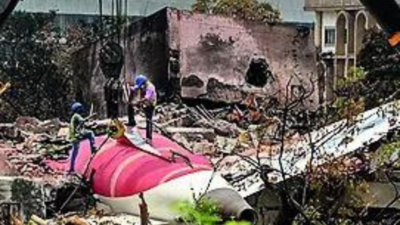Ahmedabad crash fallout: DGCA directs AI & IndiGo to conduct post trauma workshops for ‘worried’ crew members | India News

NEW DELHI: The Directorate General of Civil Aviation (DGCA) has directed India’s major airlines — Air India and IndiGo — to hold post trauma mental health workshop for their flight crew. The directive comes after witnessing a significant massive impact of the tragic June 12 AI 171 crash in which 260 people lost their lives on the mental health of both pilots and cabin crew. AI even saw mass sick reporting by them soon after the crash on a few days as the many of the crew members were too stressed to report to work in the right frame of mind.“The DGCA has asked AI to hold the workshops and offer support. AI despatch now often has a psychologist in case some crew members wants counselling before operating their flight. IndiGo, which has a very wide network, has been asked to conduct e-modules of this workshop,” said officials across airlines.Pilots are especially on the tenterhooks as there has been no preliminary report even 24 days after the accident that could indicate what caused the crash just 30 seconds after take off. No one knows who all are investigating the crash, apart from AAIB chief. That suspense is taking its toll on everyone, but more so airline crew. Now it is common for crew to say a silent prayer first when an aircraft gets safely airborne and then when it completes its journey.The DGCA has even directed the major airlines “not to push” crew to come to work if they are not feeling upto it to operate a flight. “Mental health affects physical health, which in turn affects the ability to operate flights safely. Till the cause, even a preliminary one, is known of AI 171 crash, the feeling of jitteriness among crew members is likely to continue,” they said.“One of the two major Indian carriers has been putting crew members on standby duty whenever it wants, thereby inducing more stress among pilots even though there are required number of standby crew when the flight programme is published. Then there are continuing pay issues with the fix pay being reduced to 40 hours from 70 earlier. Our weekly offs are not printed on the rosters. As it is this was causing both mental and financial stress among pilots. The crash has made things even worse for us,” said pilots.Multiple pilots, especially of the Boeing 787 that crashed in Ahmedabad last month, have been reporting trauma after the accident. “The conversation in cockpits these days is mostly limited to what could have caused the crash. What is it that went wrong. That is really eating us up. With no guidance from the probe panel so far, we are all in the dark and jittery,” said multiple pilots.The US Federal Aviation Administration (FAA) has guidelines on how aviation medical examiners should assess and evaluate pilots for post-traumatic stress disorder (PTSD). The European, Australian and International Civil Aviation Organisation also have guidelines for the assessment of PTSD in aviation. PTSD is known to compromise aviation safety.





